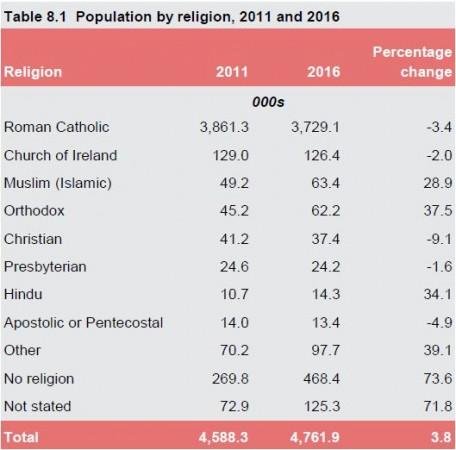Traditional Worldviews vs. Changing Worldviews in Ireland
Overview of Ireland's Dominant Worldview
While Ireland promotes religious freedom in their Constitution, many Irish citizens identify as “Roman Catholic,” which demonstrates the influence of one dominant “worldview” on Irish culture (“Irish Culture,” 2022; Samovar, 2017, p.103). Larry Samovar, author of Communication Between Cultures, asserts that “a culture’s worldview" provides people with a framework to answer "major assumptions about life" (Samovar, 2017, p.104). “Worldview” encompasses a person’s attempt to answer life’s fundamental questions (Samovar, 2017, p.104). For example, about “76%” of “Irish Catholics” accept that “God created the universe” (McGarry, 2012). This belief suggests that some Irish citizens see the basic tenets of Catholicism, such as Jesus’ “resurrection,” as key to understanding their role in the world (McGarry, 2012). Tom Inglis, author of “Church and Culture in Catholic Ireland,” reinforces this notion when he argues that “the majority of people" practice Catholic baptisms, marriages and funerals (Inglis, 2017, 21). This idea demonstrates that “Catholic” values and perspectives on issues, such as death, impact how Irish people choose to live their lives (Inglis, 2017, 21).
 |
| Breakdown of Ireland's Religious Affiliations |
How Catholicism Impacts Irish Culture, Political and Social Life
Since Catholicism encompasses the dominant “worldview” in Ireland, its principles influence and impact distinct aspects of Irish society (Inglis, 2017, p.22). The Cultural Atlas’ article “Irish Culture,” contends that “the Catholic Church" oversees Ireland's schools and hospitals, which extends their influence into cultural and governmental affairs (“Irish Culture,” 2022). This “role” frames the “Catholic Church” as responsible for many aspects of Irish society (“Irish Culture,” 2022). For example, the New York Times states that the “Catholic Church” controls “97%” of Irish “state-funded primary schools” (Dalby, 2016). This idea implies that the “Catholic Church” oversees the “religious” and secular education of multiple students, which affects how they view certain cultural ideals, such as morality (Dalby, 2016). Raphael Gallagher, author of “Morality in a Changing Irish Society,” reiterates this viewpoint when he asserts that some Irish people base their “moral” decisions on what “the Church wants” (Gallagher, 1981, 714). He suggests that the Catholic Church’s influence directly and indirectly extends to people’s personal lives (Gallagher, 1981, 714). One question remains: does the “Catholic Church” still influence Irish cultural traditions today (Gallagher, 1981, 714).
 |
| Influence of the Catholic Church in Ireland |
This link illustrates how the Catholic Church influenced all aspects of Irish life, including architecture.
How Other Worldviews Influence Irish Culture
Although some in Ireland identify as Catholic, many choose to reject the basic tenants of Catholicism and pursue different worldviews, which creates challenges for intercultural communication (McGarry, 2012; Samovar, 2017, pp.157, 160). The CIA Factbook states that 21.7% of Irish citizens identify as a member of another religion (e.g., “Muslim”) or as non-religious (“Ireland,” 2022). These identifications represent a shift from strict adherence to Catholicism toward greater religious tolerance and diversity (“Ireland,” 2022). For example, “78%” of Irish society chooses to practice their own standards of morality instead of adhering to “Catholic” moral standards (McGarry, 2012). This idea suggests that many Irish citizens are rejecting basic “Catholic” principles and tolerate people deciding their own “worldview[s]” (McGarry, 2012; Samovar, 2017, p.104). However, Douglas Dalby, author of “Catholic Church’s Hold on Schools at Issue in Changing Ireland,” rejects this notion when he claims that “local schools often choose to admit Catholics over non-Catholics” (Dalby, 2016). This “religious preference” in “school admissions” illustrates aspects of Irish society that choose to follow “Catholic” principles at the expense of religious tolerance (Dalby, 2016). The conflict between Catholicism and opposing worldviews exacerbate the tensions between traditional values and changing societies (McGarry, 2012; Samovar, 2017, pp.157, 160).
Catholic Church’s Hold on Schools at Issue in Changing Ireland New York Times
Comments
Post a Comment